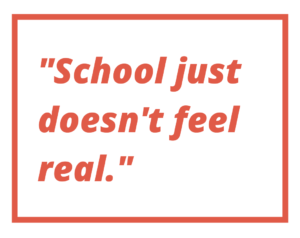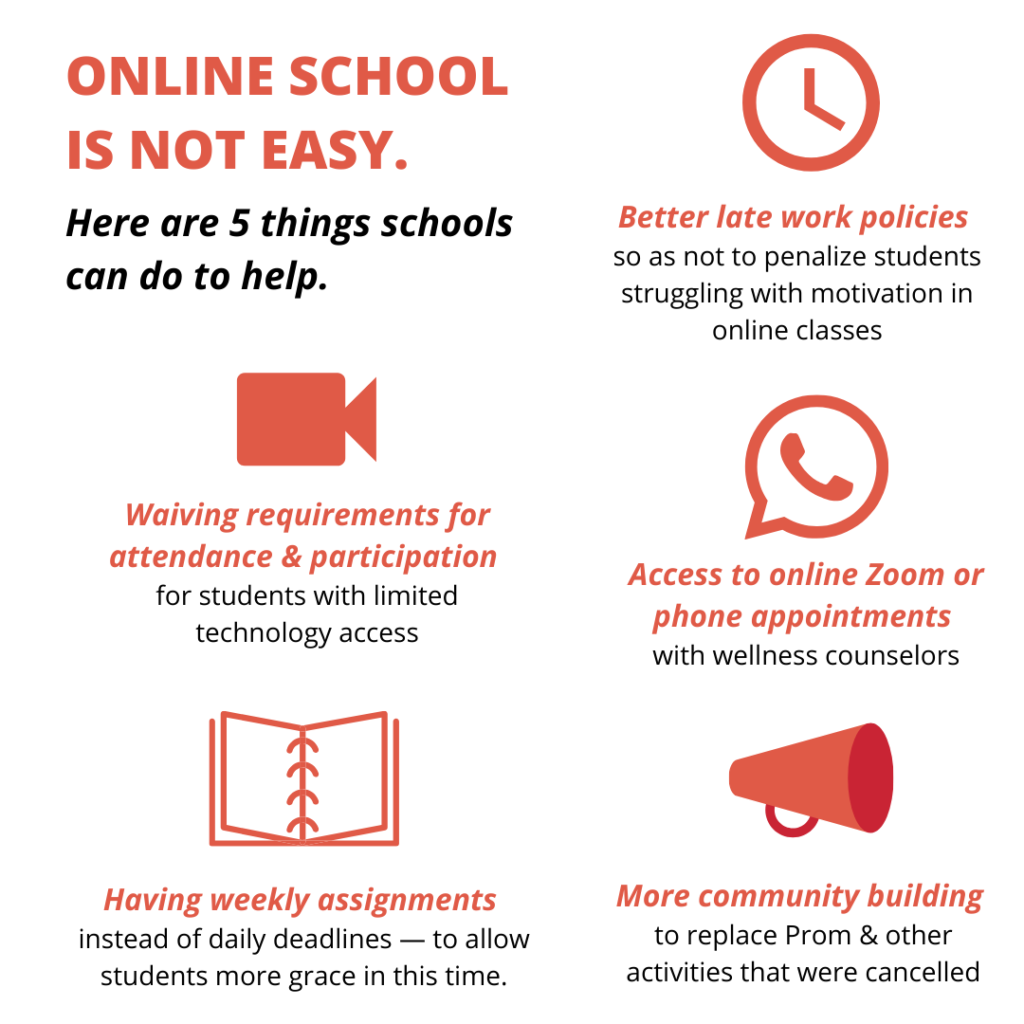When we started writing this piece, it was about mental health supports in high schools. However, since many young people are attending school online, we began to ask about the impacts of this transition on young people’s mental health. To understand these impacts, YLI talked to 6 young people from 3 different schools: Half Moon Bay High School (HMBHS), Westmoor High School (WHS), and South San Francisco High School (SSFHS). We have omitted their names to protect their privacy.

Young people have had varying experiences attending school online while sheltering in place. Some young people do not have a private room where they can attend Zoom classes, some do not have laptops or wi-fi to complete assignments, and some struggle with the lack of social interaction.
The truth is, learning online is simply not the same. Students, for the most part, have been trained to learn in a classroom. We are social learners: we learn best alongside our peers and have more organic conversations in person. While teachers may have employed online tools in their classes before, moving fully online deprives many students of their natural strengths in the classroom: their teachers and peers.
Whether a Zoom classroom, a video, or simply an assignment, many students are not getting what they need to learn. One student shared that some subjects, like math and chemistry, are best learned in person, when students can ask peers and teachers clarifying questions. Studying online means that her grades are suffering.
“School,” she said, “just doesn’t feel real.” Disconnected from peers and teachers, she’s struggling to find the motivation to finish the year.
She’s not alone. The students we talked to shared that going to school, seeing friends, being on sports teams and seeing teachers helped motivate them. Since school moved online, they have struggled to muster the motivation to attend classes and complete assignments. In-person interactions matter — text, video call, and online interactions are no replacement for seeing people in person. This includes wellness counselors.
 SSFHS, HMBHS, and WHS all have wellness counselors. However, they are not always well-known or easy to access. Students often have to go through guidance counselors or administrators to access wellness counselors, and what support they had in person has dropped off since school has moved online. It’s not always clear to students where they can access resources, and e-mailing administrators to find out can be intimidating.
SSFHS, HMBHS, and WHS all have wellness counselors. However, they are not always well-known or easy to access. Students often have to go through guidance counselors or administrators to access wellness counselors, and what support they had in person has dropped off since school has moved online. It’s not always clear to students where they can access resources, and e-mailing administrators to find out can be intimidating.
Access to mental health support is important because many students are actually experiencing poorer mental health while attending online school. One student who does not have wi-fi at home said, “I used to stay late at school to access the wi-fi, but now that students cannot go on campus, I have to go into work to complete assignments.”
In an environment like that, completing assignments, let alone attending live Zoom classes, is an uphill battle. It’s important for young people to have access to stable, reliable technology, including Internet access that meets the needs of young people and their families. Similarly, students need proper mental health infrastructure in order to attend school online.
Across interviews, students called out the need for more grace and support in teachers’ and schools’ policies. We have summarized some of their recommendations here.

— Better late work policies for students who do not have access to wi-fi, or the tools or environment to complete these course loads
— Having weekly assignments instead of daily deadlines, to allow students more grace in this time
— Waiving requirements for attendance and participation for students struggling with technology access, privacy, or home environments, instead of assigning more work
— Access to online Zoom or phone appointments with their wellness counselors
— More community building opportunities through schools’ social media pages, including spirit days and activities to replace Prom and the many year-end activities that were cancelled
Asking students to re-learn how to learn, without sufficient peer and teacher interaction, sets students up to fail, and harms their mental health. School is so much more than attending class; it’s an ecosystem of support and interaction. As many schools consider continuing classes online in the summer and fall, schools must take responsibility for moving this ecosystem of support online too.
No matter how much has been compromised by this pandemic, supporting students is not optional.
